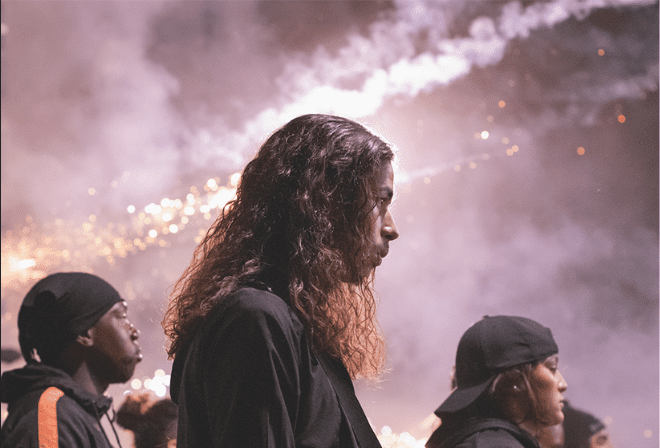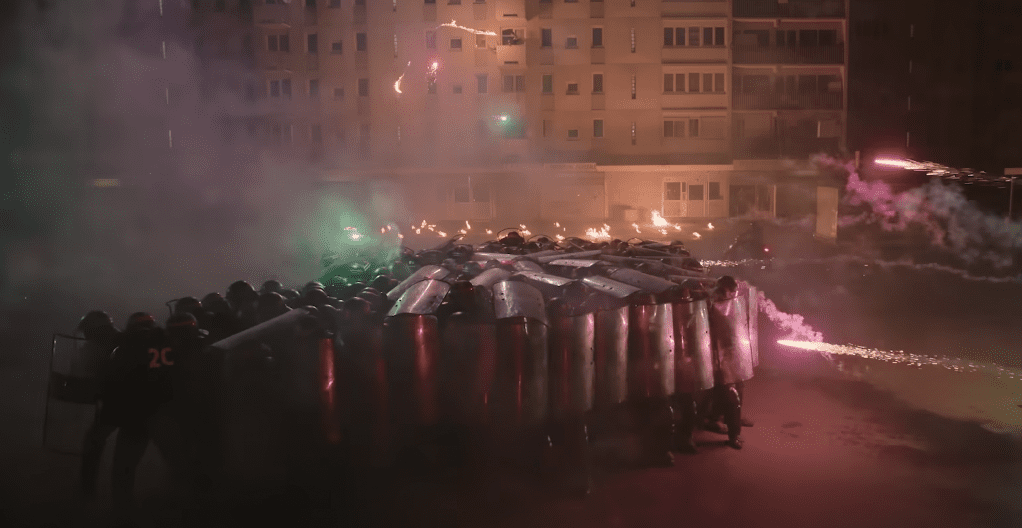
Youngest son of the prolific Gavras family, Romain’s third feature film is a story of three brothers involved in a riot within the fictional French banlieue of Athena. With a teaser trailer that cites Heraclitus: ‘It is difficult to fight anger; for a man will buy revenge with his soul’, the journey into all-out civil anarchy promises a lofty epic, but after nearly two hours of relentless carnage, there’s not enough wisdom to justify the Grecian namesake it burns down.
Perhaps, of course, this is the movie’s core point—the fruitlessness of the conflict it describes. It’s difficult to deny the ride isn’t thrilling for at least the first two acts, especially in the opening scene that deftly sets up the drama within three minutes. Algerian soldier Abdel (Dali Benssalah) returns to mourn his teen brother Idil—killed by a mysterious act of police violence—and demands a peaceful vigil. Hidden in the crowd, younger brother Karim (Sami Slimane) incites a riot to avenge him. As the protest explodes, older brother and gangster Moktar (Ouassini Embarek) leads the early action, bailing out his supply of drugs from the soon to be city-wide crime scene while Karim’s gang of protesters clash over who really calls the shots. Brilliantly, the set-up teases a rivalry between a young political zealot; an older, self-serving criminal and a furious soldier that seems like a biting satire for France’s political climate and racial violence.
Famous for his music videos like Kanye’s No Church in the Wild, Gavras wastes no time painting the dusted streets with saturated Molotov flares, images that are the best of Jin Roh’s cell-shaded riots with a modern Les Mis flair. Always slick, the issue with Gavras’ reliance on the one-shot format is it feels so over-stylized it undermines the seriousness of his film. Compared to Iñárritu’s heart-wrenching Birdman (with a camera that would soar over the room during Thomson’s moments of fantasy) or the unending Victoria and 1917 (whose grounded lens kept a constant tension) Gavras’ early shots float between angles and scenes as if on rails: capturing the mayhem like a distant voyeur taking in his greatest hits. Only by the end, in the crumbled walls of a besieged apartment, do we get the intimacy of the one-shot that feels closer to the gritty, political language of his script.

When the absurdism and carnage gets ramped up to the nines, however, Gavras find music in the madness: there’s no real side to root for as the cops overpower the young rioters in the second act and avenge themselves with baton slaps. When the police tortoise up in another hail of fireworks, or a young man saddles up with his stolen police horse in a garage, the barely there restraint—smoke barrages, beatings, fireworks and stones—embody the violence with a kind of Meursault senselessness. It’s a believably anarchic beauty that the young Karim seems consumed into escalating in his ‘eye for an eye’ journey of revenge.
The cost of an eye for an eye, however, is blindness: and by the movie’s endpoint, after the umpteenth molotov, firework or ‘merde’, the beats feel overcooked—too violent to be serious and too loud to feel intimate. As a result, the dramatic notes offer little catharsis and the ending lags for twenty minutes. Benssalah’s otherwise strong performance descends into eyeball-popping farce in a moment that’s meant to be heartwrenching, and an additional sub-plot with a kidnapped copper feels out of place—like a child waiting to go home. Rare moments of silence give us tantalising moments of connection with the brothers, but the camera always hovers away quickly; as if Gavras’ music vid credentials have him searching for the nearest speaker to keep his afterparty burning. Brilliant at parodying the wider conservative soundbites, ‘we need to re-arm the police, morally and materially’, the movie’s own attempt at peacekeeping comes across as stilted and edgy. Although politics is always in the lurch, it never emerges as a deep conversation beyond stock quotes and tropes. If that was Gavras’ point, then the realism feels strangely juvenile next to his obvious style: a Project X snapshot of anarchy that’s fast—moving, heady and gleefully doomed.



